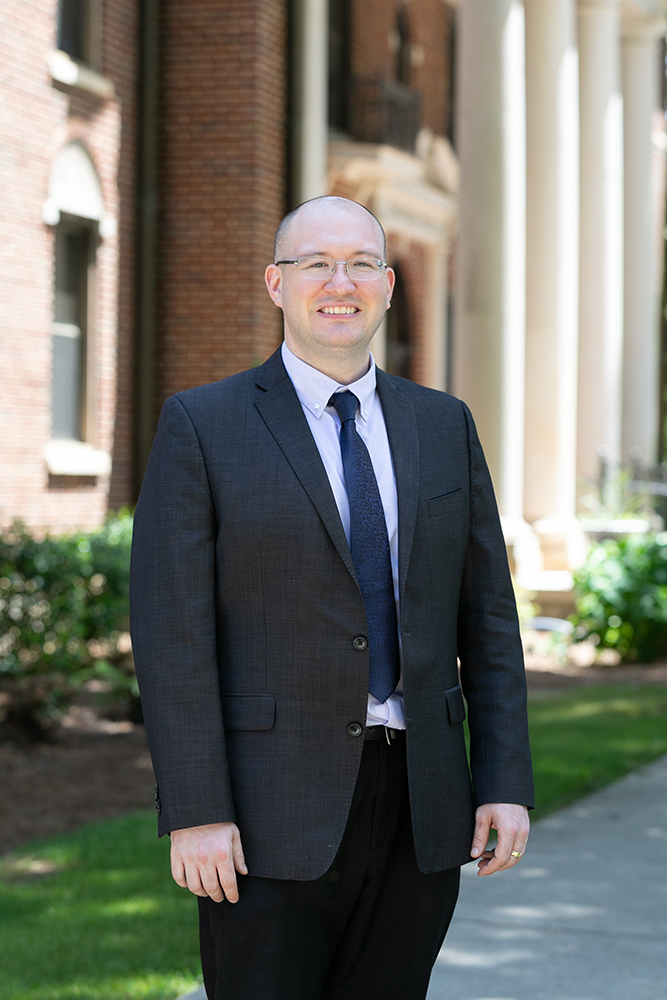
The first principle in Associate Professor of History Dr. Franklin Rausch's philosophy of teaching is to make things as relevant and useful as possible.
Rausch, who was recently named Lander University's Distinguished Professor of the Year, said he wants to "help students understand the world that they live in. I think that's one of the intended purposes of history."
For example, Rausch, an Asian Studies expert, is currently teaching an online course in Modern East Asia, and one of the topics that he's covering is the political differences between China and the U.S.
"My hope is to get American students to understand a little bit better why the Chinese government acts the way it does, how it operates, and the history that influences it," he said.
Historians are often accused of being unable to give a simple answer, and Rausch pleads guilty as charged. He said he tries to "go into a lot of detail, just to show complexity."
Another principle governs Rausch's relations with students. He said he tries to treat students in a way that, as a parent, he would feel comfortable having his own children treated. He tries to imagine himself explaining his treatment of students to their parents. "It's a mental exercise, purely," he said, adding that he's never had to explain anything to a parent.
Rausch was asked how he came to choose Asian Studies as his area of specialization. He said that the Asian friends he made as an undergraduate at Indiana University were part of the reason. The majority were Korean, but he also came to know students from elsewhere in East Asia.
He was struck by the differences between them. "They share so much history together, and they're so similar, and yet there are these things that are different. That was something that was fascinating to me," he said.
After earning bachelor's and master's degrees at Indiana, Rausch enrolled in the Ph.D. program in Asian Studies at the University of British Columbia, focusing in his dissertation on violence against Catholics in 19th century Korea.
Along the way, he met his future wife, Arlene, a native of the Philippines. The two corresponded for a year and a half before meeting each other face to face on Valentine's Day in 2004. They were married later the same year.
A competent speaker of Korean, with a reading knowledge of Japanese and Classical Chinese, Rausch has lived and taught in Korea. He has also spoken at numerous international conferences there, and has sometimes been the only westerner in attendance. He was asked what, in his opinion, Koreans think about his interest in them, their language, and their country.
"It's generally a kind of appreciation," he said. "I think they're flattered by it."
Rausch is a prolific scholar. In the past three years, he's published a book, five book chapters, two journal articles, three book reviews, two online academic publications and three translations. He recently co-authored a translation of the works of Korean nationalist Ahn Junggeun, which is currently under review. For eight years, he has served as an assistant editor for the "Sungkyun Journal of East Asian Studies." He has also acted as a reviewer of submissions to "Acta Koreana"; "American Historical Review"; "Catholic Historical Review"; "Journal of the History of Ideas"; "Journal of Korean Religions"; "Journal of Peace Education"; "Korean Studies"; "Nations"; "Review of Korean Studies"; "U.S. Catholic Historian"; Harvard University Press; Palgrave McMillan; and the "Oxford Research Encyclopedia of Asian History."
For people like Rausch, who serves on several committees at Lander, the work never ends.
"My field is small enough that we all know each other, and once someone knows you will submit your reviews on time, they will keep asking you to do them," he said.
One thing that Rausch doesn't have to worry about anymore is moving, and after living in Canada, the Philippines, Indiana and Florida in addition to Korea, that suits him fine. He calls Greenwood "a great place to raise children." The Rausches have two sons, David, 12, and John, 7. Rausch's parents, David and Linda, live with them, too, an arrangement that he calls "very Confucian."
Rausch is happy to be at Lander. "I love the people I work with, and our students are wonderful," he said.
He feels "honored and humbled" to receive Lander's top faculty award. "Now I have to live up to it," he said.
This story is featured in the Fall 2019 edition of Lander Magazine. Read more at www.lander.edu/magazine.